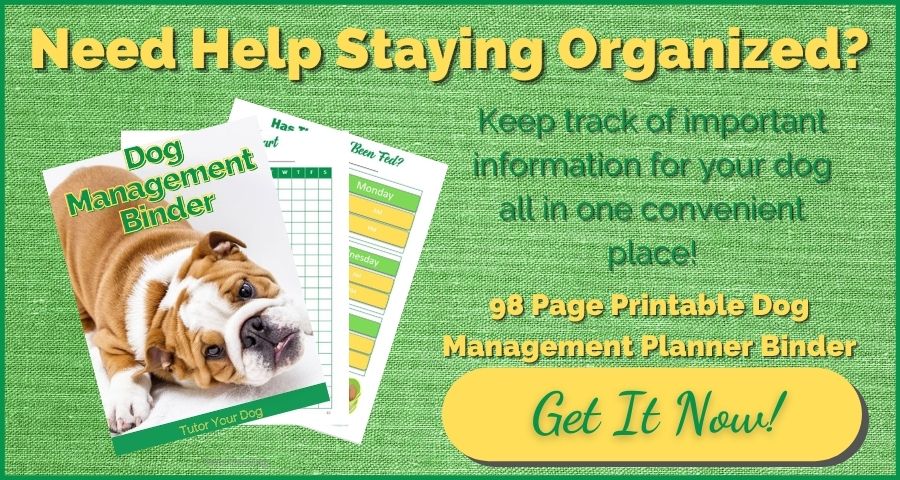{This post may contain affiliate links. This means we may make a small commission at no extra cost to you. This website is a participant in the Amazon Services LLC Associates Program. As an Amazon Associate we earn from qualifying purchases. We only recommend products that we believe will be of value to our followers. Click HERE to see our disclosure for details.}

Today’s the day! You are finally able to bring your puppy home. This is a very exciting day for your family but keep in mind that this is a huge adjustment for your puppy. Some puppies adjust to their new homes easier than others and with some help, we can make that transition easier for them. We have some tips to help you and your puppy get through his first night home.
Prepare For Your Puppy’s First Night Home In Advance
With all of the excitement of bringing home your new puppy, you will want to have everything set up for him in advance. This way, you can enjoy your puppy without worrying about getting things ready for him. Planning everything in advance will allow you to focus your attention on your new puppy and when the time comes, you will be glad you prepared in advance!
How Should You Prepare For The First Night With Your New Puppy?
•Adjust Your Schedule
Try to bring your puppy home when you are going to be home for a few days in a row. A weekend works well or if you have some vacation time, now is the time to use it. This will give you time to bond with your new puppy and make sure that he gets on a puppy schedule. Keep in mind, that he should have crate time even when you are at home. This way, when you go back to work or have to leave him, it won’t be a big deal for him.
The first night with your new puppy could be a long one. It’s most likely his first time away from his mom and siblings so he may cry a bit in his crate. Keep in mind that you may also not get a whole lot of sleep for the first week or so. Your puppy may need to get up through the night for potty breaks. Once he can make it through the night without a potty break, things will get better.
•Keep Things Quiet
Keep the first week or two quiet for your puppy. Try not to have extra people in your home or a lot of commotion. This will give your puppy some time to settle in and be comfortable in your home before meeting new people. This is a huge adjustment for a young puppy so try to keep the excitement and commotion to a minimum while he adjusts.
•Puppy Proof Your Home
Make sure that your home is puppy proof. This means concealing all electrical cords or cords for window blinds. Make sure any cleaners are locked away. Keep all household plants out of reach of your puppy. Put your shoes in the closet and pick up any clothes or toys that may be laying around.
•Have All The Supplies You Need For When You Bring Home Your New Puppy
Supplies You Need For Your Puppy’s Arrival:
1. Food And Water Bowls
There are several styles of food and water bowls to choose from for your new puppy. There’s everything from metal Yeti bowls to bowls that only allow access to your puppy when his microchip is programmed into the bowl (this is actually an excellent choice if you have more than one pet, especially if they don’t eat the same food).
Check out The Top 5 Best Automatic Dog Feeders for more choices or click on the images below to check out dog food and water bowls on Amazon.
2. Collar And Leash
You should get your puppy used to his collar and leash right away. You will need to take him outside for potty breaks, which will be much easier if he’s used to walking on a leash.
3. ID Tag For Collar
Having some sort of ID for your puppy is so important! If you are on social media, I’m sure you’ve seen the thousands of “Missing Dog” posts. Having a microchip and an ID tag makes it much easier to be reunited with your puppy if he happens to get lost.
4. Puppy Food
Always ask the breeder or the rescue what type of food your puppy is eating. Keeping him on the same puppy food at first is important if at all possible, so that he doesn’t get an upset stomach from the change of diet. If you want to change his food, do so gradually by slowly mixing in the new food to what he is already eating. Start reducing the old food and increasing the new food until he’s only eating the new food. This should take a week or two in order to transition your puppy to the new food without upsetting his stomach.
5. Crate
Crate training is such an important part of raising a puppy. His crate is his “house”, his safe place. It’s also an important tool that you can use for house training your puppy.
*Helpful tip: keep your puppy’s adult size in mind when ordering his dog crate. Most wire crates have a divider so that you can make the crate have a smaller area for your puppy when he’s small and increase the amount of room that he has as he grows.
6. Puppy Play Pen and Gates
You may want to restrict where your puppy can go in your home. By using puppy play pens and gates, your puppy can have access to the places where he’s allowed and be restricted from the areas that you don’t want him to go.
7. Poop Bags
Every dog owner needs poop bags. It’s so important to clean up after your dog when you are out in public. This is part of being a responsible dog owner. I found a great deal on Amazon that includes poop bags, and a poop bag holder that is also a flashlight! This is perfect for those after dark potty breaks.
8. Dog Bed
Puppies like to have a nice cozy spot to curl up in. You can teach your puppy from an early age, that his dog bed is his “place”.
*Helpful tip: Keep in mind how big your puppy will be as an adult and order your dog bed accordingly.
9. Puppy Toys
All puppies need toys to play with. You can have a variety of toys for him from chew toys to fetch toys to mental stimulation toys. There are also toys that make the transition to a new home easier for your puppy. It’s a huge adjustment when a puppy leaves their mother and siblings. The Smart Pet Love Snuggle Puppy is a toy for your puppy that is heated and helps to calm your puppy and reduce the stress of leaving his mother and siblings.
Related Article: The Top 10 Best Indestructible Dog Toys For Aggressive Chewers
10. Training Treats
Training your puppy should start as soon as you bring him home. Make sure you do not overdo it with training treats, though, as you could upset his stomach. Small bite sized treats are perfect in small amounts.
Check out our full list of puppy supplies with our New Puppy Supplies Checklist.
What Should You Do When You Bring Home Your New Puppy?
• Start Your Puppy On A Schedule
Pets love routines, it helps them settle in faster when they know what to expect. Get your puppy into a regular routine from the very beginning. In your puppy’s schedule you should include time for meals, potty breaks, naps, playtime and walks.
•Stay Calm
Stay calm around your puppy. He may be nervous being away from his mom and siblings for the first time. Keeping everyone in the family calm will help him to settle faster. This should be a time that your puppy is allowed to explore (supervised) and meet his new family.
Introducing Your New Puppy To Your Children
Explain to your children that they have to remain calm around the puppy. Have them sit in the room and let the puppy come to them. Do not allow the children to chase the puppy, this will only scare him.
Introducing Your New Puppy To Other Pets In Your Home
If you have another dog in your home, you will want to check out our article, 8 Tips For Successfully Introducing Your Dog To A New Puppy. If you have a cat, make sure that the cat has a place to escape out of the reach of your puppy. It’s important to keep all pets safe during the introductions. Don’t push them to be instant friends, let them get used to each other on their own terms.
•Establish Rules For Your Puppy
Think about how you want your puppy to behave when he’s all grown up. Some behaviors might be cute during the puppy stage but will they be cute when your puppy is full grown? If they answer is no, then do not allow the puppy to do it from day one. For example, if you don’t want your puppy on the sofa when he’s all grown up. don’t allow him on the sofa from day one. A puppy nipping at your pant leg might be funny but when he’s all grown up, it won’t be so funny anymore. Don’t allow behaviors now that you won’t want when your dog is an adult.
Consistency is important when establishing rules for your new puppy. This means that all members of the family need to know the rules. All members of the family need to make sure that the puppy follows the rules.
•Start Training Your Puppy
The best time to start training your puppy is from day one. Don’t overdo it, though, especially on the first day. Keep your training sessions simple and short. For example, lure your puppy into the sit position before giving him a treat.
Tips For Surviving The First Night Home With Your New Puppy
1. Let Him Get Used To His New Crate Before Bedtime
If your puppy wasn’t crate trained when you got him, crate training is something that you should work on. Crate training your puppy is the best way to keep him safe and it also helps with house training him. When you can’t supervise your puppy he should be in his crate. Most breeders will crate train their puppies before the puppies go to their new homes. This is something that you should find out and if the breeder does crate train it will make your life much easier!
Even when a puppy has been crated trained by the breeder or rescue, the crate that you have for him will be new to him. If you bring your puppy home in the morning or the afternoon, it’s a great idea to have him take an afternoon nap in his crate. When you see your puppy getting tired, take him outside for a potty break and then place him in his crate and let him have a nap there. He may cry for a few minutes, this is normal. If you ignore him, he should lay down and go to sleep. If your puppy hasn’t been crate trained, you will need to start that process. Let him get used to his crate and make it a positive experience for him.
Related Article: 4 Easy Steps To Crate Train Your Puppy

2. Tire Your Puppy Out
Puppies typically get tired pretty easily. Play with your puppy before bed time and get him tired. Your puppy will settle and fall asleep much faster when he is tired. Going to bed will be much easier for him if he’s already sleepy. Roll a ball on the floor for him to run after, have a good game of chase or take him outside for a walk.
Any of these activities will help to tire him out and make bed time easier. Before he gets too tired, though, take him outside for a potty break. Then, once you see that he’s having a hard time staying away, put him in this crate. He may still cry for a few minutes but if he’s really tired, he should soon lay down and go to sleep. If his crate isn’t in the room with you, it may help for you to stay with him until he falls asleep.
Related Article: 10 Expert Tips For House Training Your Puppy

3. Limit Food And Water Before Bed
When puppies eat or drink they will need to go outside for a potty break. In order to cut down on your puppy needing to go out for potty breaks through the night, have his last meal and then limit access to the food and water bowls about an hour before bed time. Some puppies will have no problem sleeping all night without going outside but others will need to get up once or twice through the night to relieve themselves. If you limit the amount of food and water they get before bedtime, this will help them to be able to get through the night without having to go outside for a potty break.
Related article: Five Avoidable Mistakes New Puppy Owners Make
An excellent way to track all of your dog’s important information is with our printable Dog Management Planner binder. Track your dog’s vet appointments, grooming sessions, training and so much more. Click on the image below to get your copy now.
4. Have A Potty Break Before Bed
Always make sure that you puppy has relieved himself before putting him in his crate for the night. If he doesn’t do this before you put him to bed, you will be getting up with him through the night. Take him outside right before bedtime for a bathroom break. Teaching him a command for this will help in the future. I use “Go Pee” or “Go Potty” when I’m training my dog to relieve himself on command. Pick whichever command works best for you and use that one consistently.
Related Article: The Ultimate Puppy Supply List; 18 Essentials That Every New Dog Parent Needs
5. Put His Crate In Your Bedroom Or Close By
This is your puppy’s first night away from the only home that he knew up until now. It’s a very stressful and scary time for most puppies. Putting his crate in your room will help to make the transition much easier on him. He will feel more secure knowing that you are nearby. Of course, for any puppy that has not been previously crate trained, this could be challenging. It really helps if you get him used to his crate during the day. This way when he goes in his crate at night it isn’t as hard on him.
Make his crate a positive place to be. Feed him in his crate, have a really tasty treat in there waiting for him each time he goes in his crate. You can put one of his favorite toys in his crate for him. Always make sure that you are either there to supervise when he has a toy or make sure that the toy is extremely durable so that he doesn’t eat it or it doesn’t become a choking hazard.

6. Play Soothing Music
Studies over the years have shown that music can greatly affect our mood. The same is true for animals. Play some soothing and calming music for your puppy. Classical seems to work the best but anything at all soothing would help. Play this music at bedtime to help your puppy relax. Set your phone or stereo to replay your soothing music playlist so that it plays until your puppy settles and goes to sleep.
Final Thoughts
Bringing home a new puppy is a lot of work, especially for the first few days. It’s a big adjustment for everyone but mainly for the puppy. With these 6 simple tips, the first night with your new puppy will be much easier on everyone. If you develop a consistent routine for your puppy, bedtime will become a breeze in no time at all. Patience and consistency are the keys to a successful transition.
Now that you have your puppy home with you, it’s time to start his training! Our article, 10 Essential Tips For Training A Puppy will get you on your way!
If you have some tips that helped you get through the first night with your new puppy , please share in the comments below.












